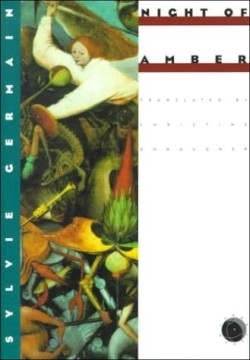Night of Amber
Germain’s sequel Night of Amber sweeps along in the same strong story current started in her first novel, The Book of Nights. The protagonist, Charles Victor Peniel, sometimes known as Night-of amber-Wind-of fire, proclaims himself “Prince very dirty and very naughty” when he is a small child. He proceeds to run relentlessly amok with a vengeance born in the moment of his bereaved mother’s howl of grief at the death of her oldest son.
Germain is a French born writer of novels and short stories and winner of several major literary prizes including the Prix Fémina. Her book, translated from the original French, is a beautiful coursing stream of strong words; it is not bashful. It is full of miraculous and epic events. Sentient trees with the power to move at will, horrific sights of World War II that leave young minds forever blasted and scarred, hearts forever maimed by grief; this novel is rich in the magical realism tradition of literature that draws heavily on ancient oral tales. This, and the convoluted family and neighbor relationships bound by limited physical space (a small village or region for example) for centuries, begs comparison with Allende and Marquez.
A homeless crone, vendor of rotten lemons, sits on a toilet on the wall of an abandoned factory site. It is twilight, and Charles Victor has been throwing stones and spewing violent words at her. She begins to chant and throw her lemons at him. “?One franc a lemon, one franc…? But just as the stones he had thrown did not reach her, so now the fruits she was bombarding him with missed their target. They did not even reach the ground. Every lemon, in mid fall, in the very momentum of its fall, was transformed and turned into a little humming bird of a very bright yellow that suddenly reversed its flight and soared straight up into the sky on a shrill note.”
Another character, a woman with the exotic name of Mahaut de Foulques, is described by fellow villagers: “She was said to be a liar and a fabulist.”
Peniel is involved with both dangerous people and situations against a background of the Algerian War and Paris of 1968. The prose is as poetic as it is fantastic, compelling and intriguing.
Disclosure: This article is not an endorsement, but a review. The publisher of this book provided free copies of the book to have their book reviewed by a professional reviewer. No fee was paid by the publisher for this review. Foreword Reviews only recommends books that we love. Foreword Magazine, Inc. is disclosing this in accordance with the Federal Trade Commission’s 16 CFR, Part 255.

